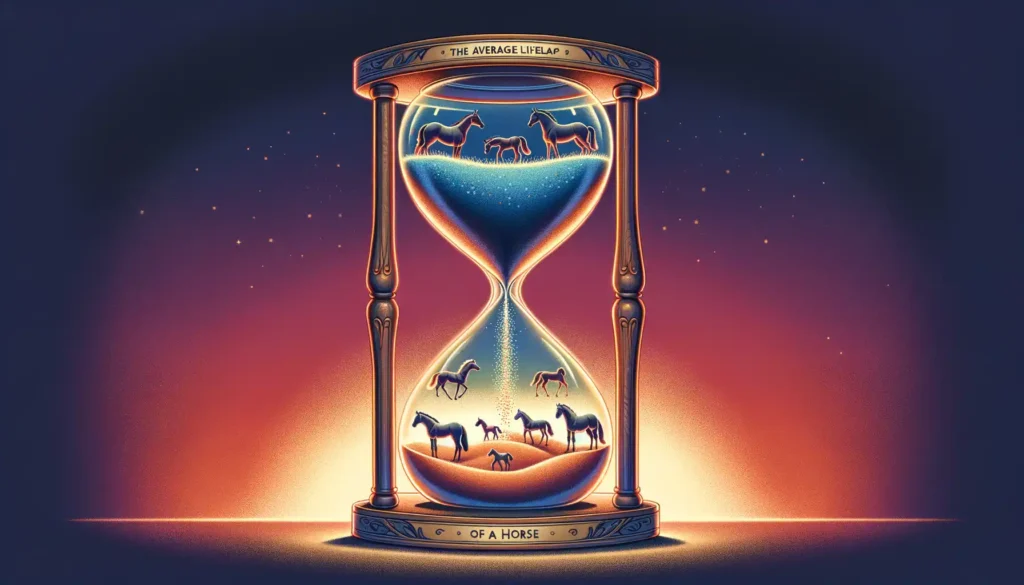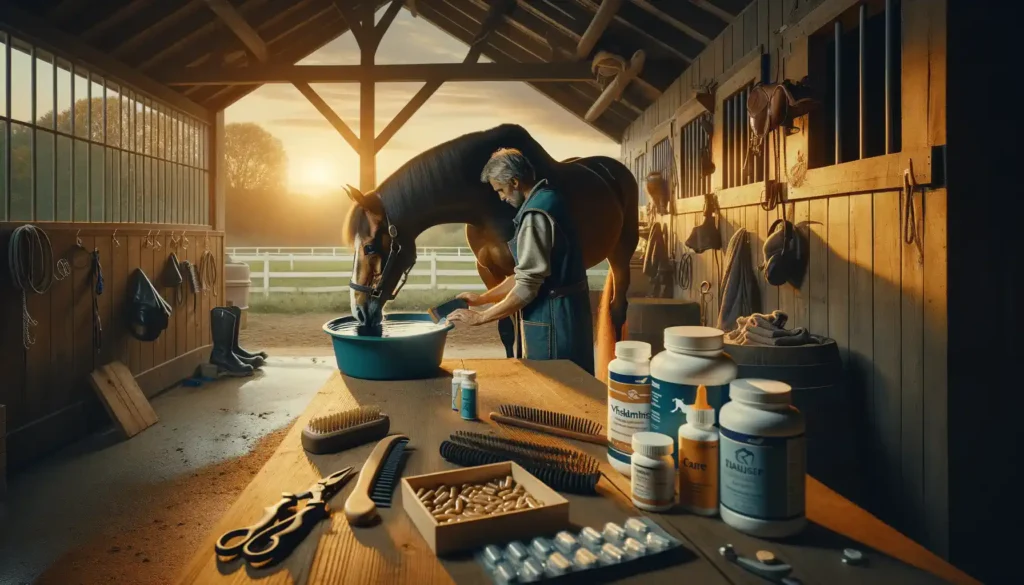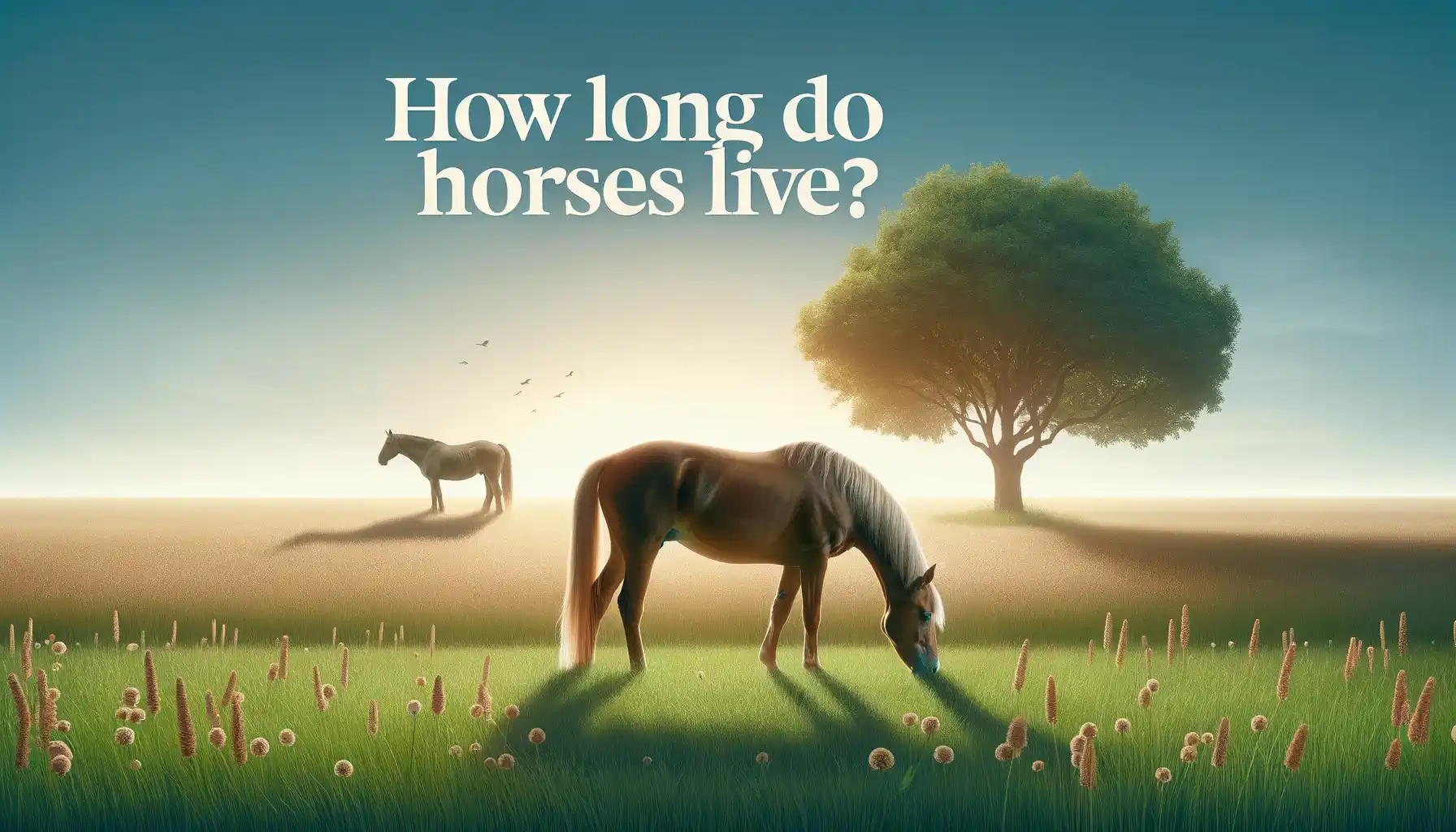Horses have been faithful companions to humans for thousands of years, serving various purposes from transportation to sports and leisure activities. Understanding the average lifespan of horses is essential for responsible horse ownership and care.
But have you ever wondered about the average lifespan of these magnificent creatures? How long can you expect your equine friend to be a part of your life?
In this comprehensive guide, we’ll explore the factors that influence the longevity of these magnificent creatures and delve into the intricacies of how long horses typically live.
Skip to Topic
The average lifespan of a horse

The average lifespan of a horse is 25-30 years. However, many factors influence longevity including breed, genetics, nutrition, housing, exercise, and veterinary care.
Smaller breeds like ponies often exceed 30 years, while large draft horses average slightly shorter lives. Wild horses generally live 15-20 years less than domesticated horses.
Providing a balanced diet, regular hoof and dental care, moderate exercise, clean and safe housing, routine vet check-ups, and quick treatment of illness all help extend a horse’s lifespan.
With diligent daily care and attention to health, domesticated horses can potentially live into their 30s or beyond. Responsible ownership and proactive care are key to maximizing a horse’s years.
| Horse Breed | Typical Lifespan |
|---|---|
| Thoroughbred | 25-28 years |
| Arabian | 25-30 years |
| Quarter Horse | 25-35 years |
| Andalusian | 25-30 years |
| Morgan | 20-30 years |
| Friesian | 16-18 years |
| Clydesdale | 20-25 years |
| Appaloosa | 25-35 years |
| Tennessee Walking Horse | 20-30 years |
| Shetland Pony | 25-30 years |
Key Factors Influencing a Horse’s Lifespan
A horse’s lifespan is determined by a combination of genetic, environmental, and lifestyle factors. Here are some of the key elements that impact how long a horse will live:
Breed and Genetics: A horse’s breed and genetics play a major role in determining its lifespan. Smaller horse breeds, such as ponies, tend to have longer lifespans than larger horse breeds.
For example, it’s not uncommon for a Shetland pony to live well into its 30s or even 40s, while large draft horses average a lifespan of 25-30 years. Genetics determine traits like size and susceptibility to certain diseases, both of which influence longevity.
Environment: The conditions in which a horse lives have a significant impact on its health and longevity. Horses that live outdoors 24/7 and get plenty of natural exercise tend to be healthier.
Stabled horses that lack turnout are at higher risk for issues like colic and arthritis which may shorten their lives. Exposure to extreme weather conditions can also take its toll. Ensuring a horse has shelter, clean water, and well-maintained pastures supports a long lifespan.
Nutrition: Providing a balanced, nutritional diet is crucial for keeping a horse healthy into old age. Quality hay and fortified grain support strong muscles, bones, and organ function.
Vitamins, minerals, probiotics, and supplements help address any nutritional gaps. Overfeeding carbohydrates and calories can lead to obesity and associated health risks.
Diseases and Dental Health: Routinely monitoring a horse’s health and quickly treating any illness or disease helps preserve longevity.
Dental care is also essential, as worn, damaged, or missing teeth make it harder for a horse to properly chew food and can lead to malnutrition. Regular veterinary and dental checkups help detect issues early.
Physical Activity: Regular exercise strengthens muscles, joints, heart, and lungs. It also helps prevent obesity. Horses that get regular work tailored to their age and ability are more likely to remain physically sound into old age. Providing turnout and free exercise in a pasture supports lifelong health.
Domesticated vs. Wild Horses

Domesticated horses tend to live longer than wild horses thanks to the enhanced care and lifestyle they receive.
On average, domesticated horses live to approximately 25-30 years of age. With excellent care and a bit of luck, it’s not unheard of for some domesticated horses to survive into their 30s or 40s.
In contrast, wild horses face more environmental challenges and threats. Food sources can be inconsistent in the wild, making malnutrition and starvation a real danger. Wild horses are also more vulnerable to predators, injuries, infections, and weather extremes with little protection or treatment. As a result, the average lifespan for wild horses is 15-20 years.
The veterinary care, balanced diet, and shelter provided by humans give domesticated horses a longevity advantage. Regular hoof and dental care help avoid potentially fatal conditions. High-quality hay and grain provide domesticated horses with reliable nutrition to keep them healthy. Stables and paddocks provide domesticated horses refuge from the elements and safety from predators.
While living wild and free has its appeal, the trade-off for horses is a shorter lifespan. With the protected lifestyle of domestication, horses are more likely to live out a long and healthy life.
Tips for Prolonging a Horse’s Lifespan

While genetics play a key role, properly caring for a horse can help add years to its life. Here are some tips:
- Provide a balanced senior diet low in sugars/starches and high in fiber. Avoid overfeeding.
- Maintain regular dental check-ups and address any issues promptly. Floating and other care helps horses properly chew food.
- Ensure regular, moderate exercise tailored to the horse’s age and ability, focusing on flexibility and range of motion.
- Monitor for health issues and seek veterinary care at the first sign of distress or disease. Annual check-ups allow early detection.
- Consider joint supplements if arthritis is present. Consult a vet on proper supplementation.
- Give horses access to pasture and opportunities to socialize and move freely with other horses when possible.
With diligent care and proactive health maintenance, domesticated horses can reach 30 years or beyond! Consult a vet to develop a customized longevity plan.
Conclusion
A horse’s lifespan is influenced by a variety of factors including its breed, genetics, housing, nutrition, activity levels, and veterinary care. Smaller breeds like ponies can live into their 30s, while heavy horses average a lifespan of only 25-30 years. Domesticated horses tend to live 5-10 years longer than wild horses thanks to the care and lifestyle provided by humans.
While genetics play a role, proper care makes a significant impact on equine longevity. Providing a balanced diet, regular dental and hoof care, moderate exercise, clean housing, and annual vet check-ups can help horses live longer, healthier lives. Monitoring for illnesses and quickly addressing any issues that arise is also critical.
With diligent daily care and proactive health maintenance, domesticated horses have the potential to live well into their 20s and some even into their 30s or 40s. While the average lifespan is 25-30 years, record-holders have exceeded 60 years of age! A lifetime of responsible care paired with a bit of luck can help ensure your horse lives out a long, happy life by your side.



